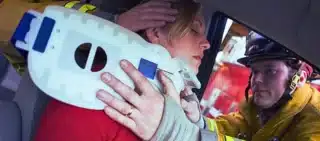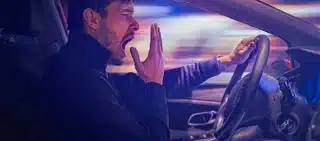
What to Do If You’re Injured in a Car Accident While Working in Illinois Work-related car accidents are common. Between...

The leading causes of car accidents in Bloomington, Illinois, are distracted driving, speeding, drunk driving, reckless driving, and fatigued driving. The most effective ways to avoid car accidents include paying attention to the road, adhering to speed limits and traffic laws, and avoiding drunk driving. Getting enough sleep before driving and avoiding using your phone while driving can also lower your chances of getting into an accident.
You should familiarize yourself with the appropriate steps to take in the event of an accident. Consider working with a lawyer with a success rate of handling car accident claims or lawsuits if someone else was responsible for your accident.
A Bloomington car accident lawyer can help you prove the other party’s liability and maximize your potential compensation. Your lawyer will achieve this by gathering and presenting strong and convincing evidence and arguments during settlement negotiations or at trial.
Distracted driving includes talking or texting on your phone, eating or drinking, adjusting the radio, or even talking to passengers. You are likelier to miss important traffic cues, make mistakes, and get into an accident if you engage in distracting activities while behind the wheel.
Drunk driving is driving with a blood alcohol concentration (BAC) of 0.08% or higher. Alcohol impairs your judgment, coordination, and reaction time, increasing your chances of causing an accident.
Drunk driving interferes with your ability to control a vehicle. The outcome is drifting out of the lane, hitting parked cars, or running off the road. It can also slow down a driver's reaction time, making it difficult to brake or swerve to avoid an accident. You are likelier to may make poor driving decisions, such as speeding, driving aggressively, or driving recklessly if you drive while drunk.
Speeding refers to driving faster than the recommended speed limit. When you are speeding, you have less time to react to unexpected events, such as traffic, pedestrians, or animals, increasing your risk of getting into an accident.
The faster a car is traveling, the more momentum it has. More momentum means the car takes more time and distance to slow down or stop.
Speeding drivers are likelier to lose control of their cars when driving too fast in wet or icy weather. It can also happen when they try to make a sharp turn or pass another car. They are also likelier to get into head-on collisions if they are driving in the wrong lane or unable to stop to avoid a collision.
This mistake can happen at intersections, when changing lanes, or when pulling out of a driveway. It can also happen when a driver does not give the right of way to another vehicle, pedestrian, or cyclist.
Failing to yield the right of way is common at dangerous intersections when merging onto a highway or turning left. A driver who fails to yield can cause a collision because the other driver will not expect that driver to be there.
Reckless driving is any driving behavior deemed dangerous or careless. It can include speeding, driving under the influence, and driving aggressively. Reckless driving can lead to accidents, as it reduces the ability of drivers to control their vehicles and react to unexpected events.
Driving in bad weather is quite dangerous and can increase the risk of accidents when drivers fail to slow down or take other precautions in bad weather conditions. Bad weather can make it hard for drivers to see and control their vehicles. They can lead to accidents if drivers fail to adjust their driving according to the weather conditions.
When you text while driving, you take your eyes off the road for an average of five seconds. In that time, you could miss a stop sign, swerve into another lane, or rear-end another car.
Tailgating is when one driver follows another vehicle too closely, increasing the risk of rear-end collisions, especially when the lead vehicle stops suddenly. When you tailgate, you get less time to react if the car in front of you steps on the brakes suddenly. Tailgating can also cause drivers to become angry and aggressive, leading to road rage incidents.
Driving under the influence of drugs, including cocaine and prescription medications, is illegal and dangerous. It can weaken a driver's coordination, decision-making, and reaction time, increasing the risk of accidents.
When a tire blowout occurs, the tire suddenly loses all of its air pressure, which can cause the car to lose control. The outcome is a spinout, a collision, or a rollover. Underinflated tires can blow out since they cannot support the car's weight properly, causing the tire to bulge and eventually rupture.
Overinflated tires are also more likely to blow out since they are under too much pressure, which can cause the tire to weaken and eventually burst.
Damaged tires from a pothole or a curb are more likely to blow out. The reason is that the damage can weaken the tire and make it more susceptible to rupture.
Also, old tires or those that have been sitting unused for a long time are prone to this problem because the rubber in the tire can start to deteriorate over time, making it likelier to rupture.
One of the ways to avoid car accidents is to develop a responsible driving attitude. Remember that you are controlling a powerful machine and your actions can have serious consequences. Also, ensure you get as much supervised practice driving as possible, since the more experience you have, the better you will handle unexpected situations.
Always wear your safety belt to protect yourself in a crash. Do not drink or use drugs before driving. These substances may impair your judgment and reaction time.
Limit the number of passengers in your car, since the more people you have, the greater the crash risk. If possible, avoid driving at night and in bad weather conditions. These conditions can make it more difficult to see and react to hazards.
If you must use your cell phone, pull over to the side of the road. Talking on a phone while driving is a major distraction. Also, choose a car with high safety ratings.
In addition to the tips discussed above, here are some other things you can do to avoid car accidents:
The government can do several things to help avoid car accidents, including enacting and enforcing stricter traffic laws. These laws can target dangerous driving behaviors like speeding, texting while driving, and driving under the influence of alcohol or drugs. It can also invest in better road infrastructure by improving road markings, installing traffic lights and cameras, and widening roads to reduce congestion.
It is the government's role to educate drivers about safe driving practices. Such an initiative can be achieved through public awareness campaigns, driver's education programs, and workplace training. The authorities should also make it easier for people to get around without cars by investing in public transportation, bike lanes, and walking paths.
Laws that ban texting while driving, among other forms of distracted driving, can help. The same applies to providing more resources to people struggling with addiction or mental health issues. These resources may include treatment programs and support groups.
Gather the right evidence and documentation shortly after getting into a car accident. You should, for instance, record the names and contact information of those involved and any witnesses. You should also exchange your driver's license and car insurance information with the other drivers. Remember to take lots of photos of the accident scene, the location of the vehicles, any damage to the vehicles, and any other relevant evidence.
Seeing a doctor shortly after the crash is also a crucial after-crash step. The doctor will examine, document your injuries, and provide appropriate treatment. Documentation obtained from your doctor will help support your car accident claim or suit in Bloomington, Illinois.
The car accident claim process usually involves working directly with the at-fault driver's insurance company. As such, the insurance company will require a lot of information from you, so be prepared to provide this information. The insurance company may also try to argue that you were partially at fault for the accident or have failed to provide sufficient documentation to support your claim.
To start a car accident claim, you must contact the insurance company and provide them with basic information about the accident. You may also need to provide authorization for your medical records release.
Be cautious when communicating with the other driver's insurance company. Even if the other driver is clearly at fault for the accident, the insurer may try to use any information you provide against you.
You may receive a settlement offer from the other party's insurance company soon after the accident. Note that the insurance adjuster's first settlement offer is just the initial step in a negotiation process. So, carefully consider this offer before accepting it. If you accept a settlement offer, you may be unable to return to the insurance company later if you need additional compensation.
On average, car accident claims take about six months to settle. The actual time it will take you to receive a car accident settlement will, however, depend on your injury severity, the amount of your damages, and the willingness of the insurance company to negotiate.
The settlement process may take longer if you have suffered significant injuries. The insurance company will need more time to investigate your claim, verify your injuries, and assess your damages.
The amount of your desired settlement will also affect the length of the process. So, if you are seeking a large sum of money, the insurance company may take longer to reach a decision.
The willingness of the insurance company to negotiate will also affect the length of the process. If the insurance company is unwilling to negotiate fairly, you may need to file a lawsuit, which can add several months to the process.
In Illinois, car accident claims get handled under the state's tort laws. This way, the person found to be at fault for the crash is liable for the other party's damages. The damages that a person can recover in a car accident case can vary with the specifics of the case.
A lawyer can help you know your legal rights and options while navigating this complex tort law system. He or she can explain the laws in your state and help you determine what damages you may be entitled to recover. You can count on your lawyer for advice on filing a claim with the other driver's insurance company or filing a lawsuit.
The insurance company may try to lowball you on your settlement offer. A car accident lawyer will negotiate on your behalf and fight compensation. If you fail to reach an agreement with the insurance company, you may need to file a lawsuit.
Filing a car accident claim can involve a lot of paperwork and back and forth with the court. A lawyer can help you with all the paperwork, including filing the claim, gathering evidence, and arguing your case before a judge or jury. The lawyer will keep you informed about the progress of your case and answer any questions you may have.

What to Do If You’re Injured in a Car Accident While Working in Illinois Work-related car accidents are common. Between...

Why Pedestrian Accidents in Parking Lots Surge During Summer in Illinois As temperatures rise, more individuals tend to engage in...

Drowsy drivers are a serious and often overlooked danger on Illinois roads. Each year, fatigued drivers contribute to thousands of...